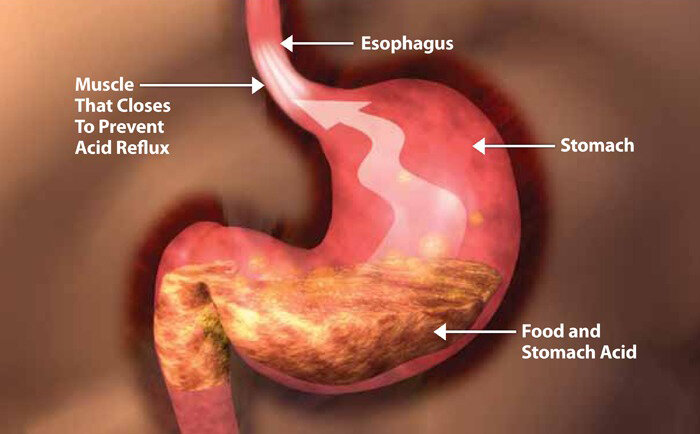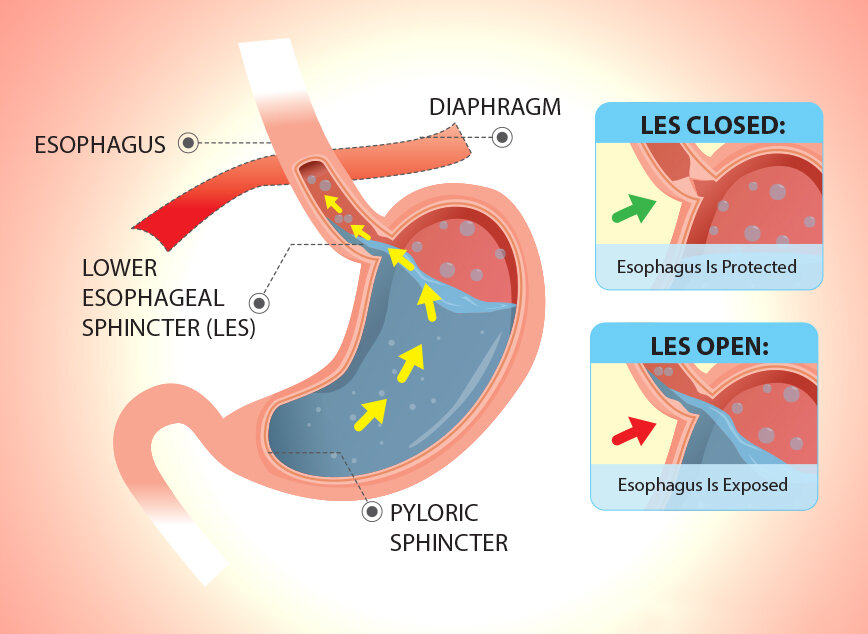Acid Reflux.... Heartburn.... HELP
Acid reflux or gastric oesophageal reflux disease (GORD) is one of the most common conditions affecting people today. This condition is characterised by a burning sensation in the chest that has coined the term “heartburn”.
Upon eating, food naturally passes from the throat to the stomach through the oesophagus. The oesophagus contains a group of muscle fibres in the shape of a ring that prevent food from moving backward from the stomach to the oesophagus. These muscle fibres make the lower oesophageal sphincter (LES).
If the LES is not closing well it allows for food, liquid and hydrochloric acid to leak back into the oesophagus. The inner oesophageal tissue is not designed to handle the strong acidity which inflames the region. This causes the characteristic heartburn sensation.
Common Risk Factors for GORD
The most common risk factors for GORD include anything that obstructs the oesophagus or stomach region such as hiatal hernia, pregnancy, and scleroderma. Other proven risk factors include obesity, smoking, aging and alcohol usage. Many prescription medications list GORD or acid reflux as a common side effect so this should always be considered.
Low Stomach Acid Can Often Be The Main Problem
The popular belief is that acid reflux is due to an excessive amount of hydrochloric acid in the stomach. New science has revealed that this is not the case. GORD is most often caused by too little hydrochloric acid being secreted by the stomach.
During digestion the stomach secretes acid to lower its pH to around 1.5-2.5 range. The LES (the valve between your stomach and oesophagus) is known to be a pH sensitive valve that initiates closure when pH drops under 3.0. When the stomach does not have enough acid the LES remains open and acid can spill into the oesophageal region and damage the tissue.
Hydrochloric acid (HCL) is also necessary for creating an acidic environment in the stomach to digest protein and ionize minerals. This also helps to stimulate bile release from the gallbladder to effectively metabolise fat in the small intestine. When the body is unable to secrete enough HCL, we have poor protein and fat digestion and may develop key nutrient deficiencies.
Hiatal Hernia and Acid Reflux
Hiatal Hernia can cause the unpleasant symptoms of acid reflux. The diaphragm helps separate the stomach from the chest. A hiatal hernia happens when the upper part of the stomach protrudes above the diaphragm, allowing acid to escape. These hernias are associated with most, but not all, cases of GORD.
H Pylori and Acid Reflux
H. Pylori is a very sophisticated microorganism that has incredible adaptive advantages that give it the ability to survive the stomach’s harsh environment. It produces an enzyme called “urease” which breaks down the urea in the stomach into carbon dioxide and ammonia. This causes belching and halitosis (bad breath) for the individual and it neutralises the acidifying effects of hydrochloric acid. This infection is the leading cause of stomach ulcers, poor digestion and stomach cancer.
The Problem With Standard Treatments
The three main types of medicines to treat acid reflux symptoms or those caused by GORD are antacids, histamine type 2 receptor antagonists (H2 blockers) and proton pump inhibitors (PPIs).
Many people use these medications to relieve the pain of heartburn. This covers up the symptom (reducing acidity) but only makes the problem worse by decreasing the acidity. This process limits the body from effectively digesting the food. This causes further stress on the enzymatic system of the pancreas as well as the other digestive organs.
Hypochlorhydria is the clinical term for low stomach acid, is an under-researched and dangerous condition. Every time you take antacids, H2 blockers or PPIs, you are contributing more to this problem (which may be one reason you develop heartburn in the first place). Prolonged hypochlorhydria leads to chronic atrophic gastritis and is associated with side effects including vitamin B12 deficiency, autoimmune conditions, asthma, diabetes, chronic fatigue and many other disorders.
Natural Treatments for Acid Reflux
Eat an Anti-Inflammatory Diet
Virtually every research study done on GORD and acid reflux points to diet as a contributing factor. First and foremost, the symptoms of acid reflux and GORD must be treated by changes in your diet in order to avoid long-term complications and restore healthy digestive function. Don’t ignore your body trying to alert you to a problem in your digestive tract.
For good digestive health and overall health and wellness, it’s important to select unprocessed, whole-foods (organic if possible). Increasing fibre intake, supporting healthy bacteria in your gut with prebiotic and probiotic rich foods can help resolve symptoms.
Consider Taking Good Quality Digestive Supplements
Taking a good digestive enzyme supplement to help the body to digest food more effectively and reduce stress on your entire digestive system.
Don’t Eat Close To Your Bedtime
Finish your last meal at least 2-3 hours before bed.
Use Lemon and Ginger
Make green drinks with a whole lemon or lime and ginger. Both of these have key nutrients that enhance HCL production.
Reduce Stress on Your Digestive System
Be sure not to try to eat solid foods when you are under stress. Stress reduces the secretion of digestive juices and enzyme production.
Use Healing Herbs
Support your digestive system with healing herbs such as slippery elm, deglycyrrhizinated licorice, fennel, aloe vera and marshmallow root.
Book an appointment today if you would like to learn more about how you can improve your digestion and get rid of those nasty digestive symptoms.




